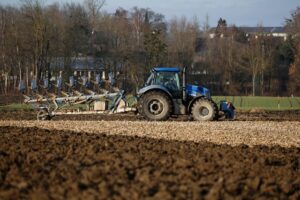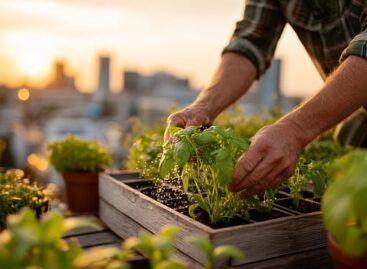The Hungarian countryside has undergone historic development
The Hungarian countryside has undergone historic development since 2010, but the investments required for this could not have been made if Ukraine were a member of the EU – the Minister of Agriculture said on Thursday in Budapest, at a press conference presenting the results of the Rural Development Program (RP).

(Photo: Pixabay)
According to István Nagy, radical changes were needed 15 years ago to put Hungarian agriculture on a growth path, as the decline of the food industry, the loss of job opportunities, emigration, and the transfer of Hungarian farmland to foreign hands had to be stopped. The government created one of the strictest land laws in Europe, helped with generational change in agriculture, renewal, increasing added value in production, and everything that is part of rural development – he added. After the Hungarian land was secured, the elimination of the common undivided property that hindered production could follow, and the taxation of family farms became more favorable. After the laws on irrigation farming and the transfer of family farms, which served the security of production, the regulation of producer cooperation laid the foundation for the security of production and raw material production, the minister recalled. He added that the Ministry of Agriculture considers the catching up of lagging regions, strengthening competitiveness, and developing rural infrastructure to be a particularly important task. The results of agricultural policy are spectacular, as more and more people see opportunities in rural life. The key element of the subsidies is the priority national resource supplement, i.e. the 80 percent budget co-financing associated with EU subsidies, which the government undertook in the interests of the countryside due to unprecedented challenges, the energy crisis, the war in Ukraine, and unfavorable environmental and market changes. This was a historic decision, as the funding framework for the support has tripled compared to the previous period, and there have never been so many winning applications – he said.
The Common Agricultural Policy (CAP) provided almost 3 thousand billion forints for the VP established in 2014
Support for labor-intensive sectors, animal husbandry, horticulture and food processing was particularly important. Applicants could apply for more than 110 calls, almost 400 thousand support documents were created, in which the payment reaches 2705 billion forints. Investments account for 60 percent of the total payment amount and represent a total of 54 thousand projects – he emphasized. He added that the role of the VP will be taken over by the CAP strategic plan in the future. The funding of the support program will exceed 5650 billion forints by 2027, of which 3153 billion forints will be allocated for agricultural and rural development purposes. He emphasized, however, that with such results “there is something to lose”, since Ukraine, as an EU member, would have sucked resources away from Hungary. It is not a mere assumption that the forced accession of Ukraine would be a disaster for the entire community, since the EU free trade agreement concluded with them immediately collapsed the internal market. Ukraine is completely unaware of the EU’s food safety and animal welfare regulations, uses dangerous pesticides, produces genetically modified products, and farmers working under strict EU constraints with their large estates would not be competitive. Accepting a neighboring country unprepared and without impact studies is irresponsible and leads to disaster. This is an issue that can determine the lives of generations, and it only takes one wrong decision to make, and there is no going back, he stated. Consumers have a fundamental right to learn about the dangers of Ukraine’s EU accession and to express their opinion on it. Without the consent of Hungarians, Ukraine cannot become an EU member state. Every vote counts because they give the authority to further strengthen the countryside. For the government, the interests of Hungarian farmers come first, and it will do everything to preserve agricultural subsidies – stated the Minister of Agriculture.
The State Secretary of the Ministry of Agriculture and Rural Development, responsible for agricultural and rural development subsidies, emphasized: based on the applications, agriculture wants to develop, 60 percent of the funds financed development and capacity expansion
József Viski said: the processing and food industry received more than 300 billion forints of this, thanks to which 2,500 jobs have been created since 2020, and competitiveness has improved. Livestock farms were able to implement 3,300 investments with more than 365 billion forints of support. As a result of the horticultural tenders, the cultivation area of the sector increased by 6 thousand hectares, and 2,000 jobs were created. In addition to forestry or nature conservation applications, 1,300 producers received nearly 180 billion forints for irrigation development to mitigate environmental changes, and the irrigated area increased by 32,000 hectares. Around 2,400 agricultural enterprises received 173 billion forints for the purchase of precision machinery. Nearly 2,500 projects were implemented from municipal tenders, including wastewater treatment solutions, rural road and settlement development, which made the lives of 2.2 million rural people easier. 115 billion forints of support were provided for energy modernization, and rural development funds resulted in a surplus of 20 percent of the production of the Paks power plant, he noted. Hungarian agriculture is on the verge of unprecedented development, he emphasized. Péter Ondré, Managing Director of the Agricultural Marketing Center, emphasized that rural development is not only in the interest of those living in the countryside, but also of the entire country. The national campaign presenting the results of the VP, which will also be available on social media and at events, focuses on raising awareness of this, he said. On the pages titled “Developing Region”, you will be able to learn about the elements of building a green future, developing the food economy, and renewing the countryside, he added. MTI/AM
Related news
State compensation for the victims of Bászna Gabona Zrt. has been completed
🎧 Hallgasd a cikket: Lejátszás Szünet Folytatás Leállítás Nyelv: Auto…
Read more >In 2025, FruitVeB considered the support and professional coordination of the TÉSZs as its priority task
🎧 Hallgasd a cikket: Lejátszás Szünet Folytatás Leállítás Nyelv: Auto…
Read more >Related news
Innovations, success stories and awards on the same stage
🎧 Hallgasd a cikket: Lejátszás Szünet Folytatás Leállítás Nyelv: Auto…
Read more >Farewell day at the 60th anniversary EuroShop trade fair
🎧 Hallgasd a cikket: Lejátszás Szünet Folytatás Leállítás Nyelv: Auto…
Read more >NAV: Women’s Day inspections begin
🎧 Hallgasd a cikket: Lejátszás Szünet Folytatás Leállítás Nyelv: Auto…
Read more >








